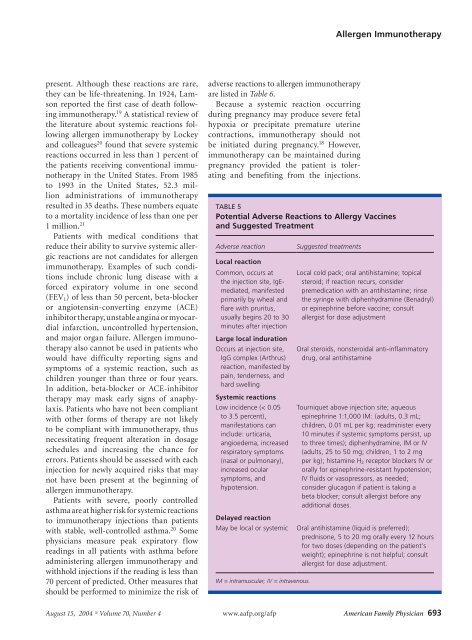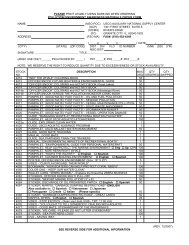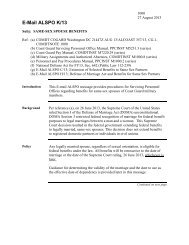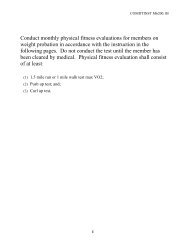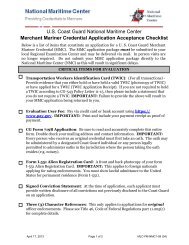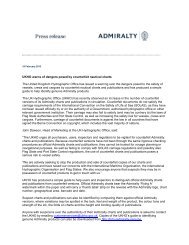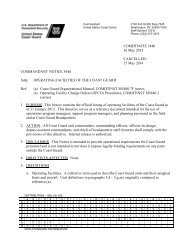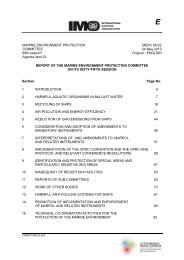Immunotherapy Safety for the Primary Care ... - U.S. Coast Guard
Immunotherapy Safety for the Primary Care ... - U.S. Coast Guard
Immunotherapy Safety for the Primary Care ... - U.S. Coast Guard
You also want an ePaper? Increase the reach of your titles
YUMPU automatically turns print PDFs into web optimized ePapers that Google loves.
Allergen <strong>Immuno<strong>the</strong>rapy</strong><br />
present. Although <strong>the</strong>se reactions are rare,<br />
<strong>the</strong>y can be life-threatening. In 1924, Lamson<br />
reported <strong>the</strong> first case of death following<br />
immuno<strong>the</strong>rapy. 19 A statistical review of<br />
<strong>the</strong> literature about systemic reactions following<br />
allergen immuno<strong>the</strong>rapy by Lockey<br />
and colleagues 20 found that severe systemic<br />
reactions occurred in less than 1 percent of<br />
<strong>the</strong> patients receiving conventional immuno<strong>the</strong>rapy<br />
in <strong>the</strong> United States. From 1985<br />
to 1993 in <strong>the</strong> United States, 52.3 million<br />
administrations of immuno<strong>the</strong>rapy<br />
resulted in 35 deaths. These numbers equate<br />
to a mortality incidence of less than one per<br />
1 million. 21<br />
Patients with medical conditions that<br />
reduce <strong>the</strong>ir ability to survive systemic allergic<br />
reactions are not candidates <strong>for</strong> allergen<br />
immuno<strong>the</strong>rapy. Examples of such conditions<br />
include chronic lung disease with a<br />
<strong>for</strong>ced expiratory volume in one second<br />
(FEV 1 ) of less than 50 percent, beta-blocker<br />
or angiotensin-converting enzyme (ACE)<br />
inhibitor <strong>the</strong>rapy, unstable angina or myocardial<br />
infarction, uncontrolled hypertension,<br />
and major organ failure. Allergen immuno<strong>the</strong>rapy<br />
also cannot be used in patients who<br />
would have difficulty reporting signs and<br />
symptoms of a systemic reaction, such as<br />
children younger than three or four years.<br />
In addition, beta-blocker or ACE-inhibitor<br />
<strong>the</strong>rapy may mask early signs of anaphylaxis.<br />
Patients who have not been compliant<br />
with o<strong>the</strong>r <strong>for</strong>ms of <strong>the</strong>rapy are not likely<br />
to be compliant with immuno<strong>the</strong>rapy, thus<br />
necessitating frequent alteration in dosage<br />
schedules and increasing <strong>the</strong> chance <strong>for</strong><br />
errors. Patients should be assessed with each<br />
injection <strong>for</strong> newly acquired risks that may<br />
not have been present at <strong>the</strong> beginning of<br />
allergen immuno<strong>the</strong>rapy.<br />
Patients with severe, poorly controlled<br />
asthma are at higher risk <strong>for</strong> systemic reactions<br />
to immuno<strong>the</strong>rapy injections than patients<br />
with stable, well-controlled asthma. 20 Some<br />
physicians measure peak expiratory flow<br />
readings in all patients with asthma be<strong>for</strong>e<br />
administering allergen immuno<strong>the</strong>rapy and<br />
withhold injections if <strong>the</strong> reading is less than<br />
70 percent of predicted. O<strong>the</strong>r measures that<br />
should be per<strong>for</strong>med to minimize <strong>the</strong> risk of<br />
adverse reactions to allergen immuno<strong>the</strong>rapy<br />
are listed in Table 6.<br />
Because a systemic reaction occurring<br />
during pregnancy may produce severe fetal<br />
hypoxia or precipitate premature uterine<br />
contractions, immuno<strong>the</strong>rapy should not<br />
be initiated during pregnancy. 18 However,<br />
immuno<strong>the</strong>rapy can be maintained during<br />
pregnancy provided <strong>the</strong> patient is tolerating<br />
and benefiting from <strong>the</strong> injections.<br />
TABLE 5<br />
Potential Adverse Reactions to Allergy Vaccines<br />
and Suggested Treatment<br />
Adverse reaction<br />
Local reaction<br />
Common, occurs at<br />
<strong>the</strong> injection site, IgEmediated,<br />
manifested<br />
primarily by wheal and<br />
flare with pruritus,<br />
usually begins 20 to 30<br />
minutes after injection<br />
Large local induration<br />
Occurs at injection site,<br />
IgG complex (Arthrus)<br />
reaction, manifested by<br />
pain, tenderness, and<br />
hard swelling<br />
Systemic reactions<br />
Low incidence (< 0.05<br />
to 3.5 percent),<br />
manifestations can<br />
include: urticaria,<br />
angioedema, increased<br />
respiratory symptoms<br />
(nasal or pulmonary),<br />
increased ocular<br />
symptoms, and<br />
hypotension.<br />
Delayed reaction<br />
May be local or systemic<br />
IM = intramuscular; IV = intravenous.<br />
Suggested treatments<br />
Local cold pack; oral antihistamine; topical<br />
steroid; if reaction recurs, consider<br />
premedication with an antihistamine; rinse<br />
<strong>the</strong> syringe with diphenhydramine (Benadryl)<br />
or epinephrine be<strong>for</strong>e vaccine; consult<br />
allergist <strong>for</strong> dose adjustment<br />
Oral steroids, nonsteroidal anti-inflammatory<br />
drug, oral antihistamine<br />
Tourniquet above injection site; aqueous<br />
epinephrine 1:1,000 IM: (adults, 0.3 mL;<br />
children, 0.01 mL per kg; readminister every<br />
10 minutes if systemic symptoms persist, up<br />
to three times); diphenhydramine, IM or IV<br />
(adults, 25 to 50 mg; children, 1 to 2 mg<br />
per kg); histamine H 2 receptor blockers IV or<br />
orally <strong>for</strong> epinephrine-resistant hypotension;<br />
IV fluids or vasopressors, as needed;<br />
consider glucagon if patient is taking a<br />
beta blocker; consult allergist be<strong>for</strong>e any<br />
additional doses.<br />
Oral antihistamine (liquid is preferred);<br />
prednisone, 5 to 20 mg orally every 12 hours<br />
<strong>for</strong> two doses (depending on <strong>the</strong> patient’s<br />
weight); epinephrine is not helpful; consult<br />
allergist <strong>for</strong> dose adjustment.<br />
August 15, 2004 Volume 70, Number 4 www.aafp.org/afp American Family Physician 693


